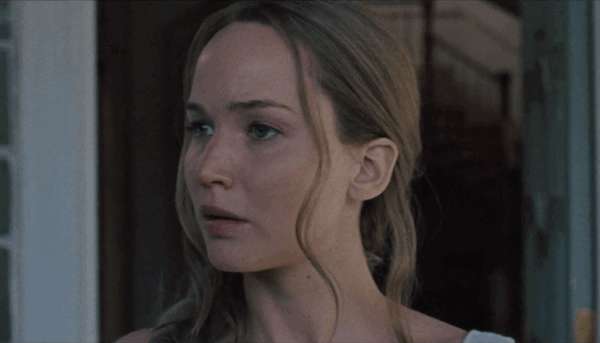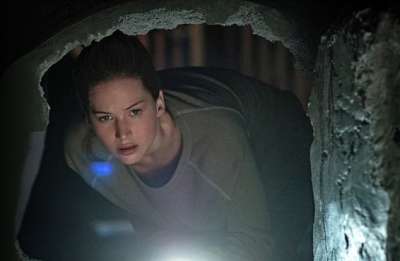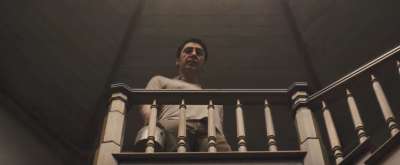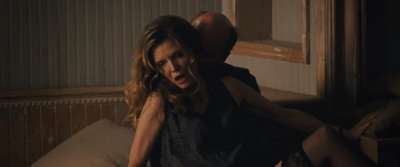
“Mother!” – a film review by Gary Chew
![]() Darren Aronofsky’s most significant films are: Requiem For A Dream, which I found a little overboard, and Black Swan, another out of the ordinary film but considerably more coherent. His latest movie is called Mother! It too comes off overboard at times, but affecting. Great cast: Javier Bardem, Jennifer Lawrence, Ed Harris, Michelle Pfeiffer and, if you keep a close eye on toward the finish, Kristen Wiig.
Darren Aronofsky’s most significant films are: Requiem For A Dream, which I found a little overboard, and Black Swan, another out of the ordinary film but considerably more coherent. His latest movie is called Mother! It too comes off overboard at times, but affecting. Great cast: Javier Bardem, Jennifer Lawrence, Ed Harris, Michelle Pfeiffer and, if you keep a close eye on toward the finish, Kristen Wiig.
 Aronofsky doesn’t provides names for his characters. Lawrence is “Mother,” Bardem is “Him,” Ed Harris is “Man” and “Man’s” wife (Pfieffer) is just “Woman.” “Mother” and “Him” live in bucolic isolation. Their residence is an old-fashioned two-story house common to creepy films. It’s set in a clearing with nothing but a thick forest encircling it.
Aronofsky doesn’t provides names for his characters. Lawrence is “Mother,” Bardem is “Him,” Ed Harris is “Man” and “Man’s” wife (Pfieffer) is just “Woman.” “Mother” and “Him” live in bucolic isolation. Their residence is an old-fashioned two-story house common to creepy films. It’s set in a clearing with nothing but a thick forest encircling it.
We don’t know where this huge house is located on a map, just that it’s old and fetching. Typically, it makes lots of creaky noises. (By the way, the sound for this film is great. I could hear every word of dialogue and the use of stereo sound, regarding the creaking, might prompt you to look behind your seat to see what may lurk in the theater’s darkness.)
Seems that “Mother” … a bit on the psychic side … is the only person who tunes into the structure’s frequency. “Him” concentrates on why he has writer’s block. (Shortly, we learn “Him” is a poet.) It’s been a long time since “Him” has been able to put anything to paper, although being previously successful.
“Mother” is considerably younger than “Him”; almost a May to December marriage. No children, but Mother is all about getting the place up to snuff with fresh paint, and what not. “Him” doesn’t do much, except trying get his Mojo back. It’s not brought up until well into the story that “Mother” longs deeply for motherhood.
 Their solitude is abruptly shaken with a knock at the door. “Who could it be?” It turns out that “Man” (Harris) is a former physician now teaching in the area of … where we don’t know. “Mother” has never laid eyes on him. “Him” has met “Man” before and they’ve discussed “Him’s” previously published works.
Their solitude is abruptly shaken with a knock at the door. “Who could it be?” It turns out that “Man” (Harris) is a former physician now teaching in the area of … where we don’t know. “Mother” has never laid eyes on him. “Him” has met “Man” before and they’ve discussed “Him’s” previously published works.
“Mother” is at sea. She wants “Him” and her to be basically alone. After all, “Man” is a total stranger to her. “Him” urges “Mother” to accept “Man” into their home, since “Man” has neglected to make arrangements for quarters, for some reason. “Mother” is not happy, but she loves “Him” deeply and aquiesces to her husband’s wish. “Man” (Harris) is gratified, and soon breaks into horrendous coughing. “Man” is a heavy smoker.
Next, “Man’s” wife (Pffeiffer) shows up on the front porch. “Him” has never met “Woman” before, she is also welcomed under the roof of “Him” and “Mother.” “Woman” obviously cares not for “Mother,” since “Mother” is more beautiful and considerably younger. Actually, “Woman,” as Pffeiffer plays the part, is a real bitch. “Mother”? Well it’s Jennifer Lawrence, and she appears to enjoy preparing meals in the kitchen and keeping the house neat as well as undertaking those remodeling tasks. Aronofsky seldom takes his camera away from closeups of Lawrence’s expressive face. It’s her movie …from her perspective, like it was Mia Farrow’s view of events in Rosemary’s Baby. You do recall Rosemary, don’t you, and her husband and their “nice” neighbors in the next apartment that looks like it might also be the home of “Mother” and “Him” in the Aronofsky picture? Booga-booga.
 The intrusion by “Man” and “Woman” takes some time, pulling you into what Arnofsky wants to get you accustomed to. Then, a tsunami of other people descend on the old house. They do so because “Him” and “Mother” make love after an altercation between them, and “Mother” knows immediately that she is with child. Such emotion fortifies “Him” to find that his writer’s block has vanished; and off to his study, with pen and paper, he commences to scribble something that no one in the audience gets to read … ever.
The intrusion by “Man” and “Woman” takes some time, pulling you into what Arnofsky wants to get you accustomed to. Then, a tsunami of other people descend on the old house. They do so because “Him” and “Mother” make love after an altercation between them, and “Mother” knows immediately that she is with child. Such emotion fortifies “Him” to find that his writer’s block has vanished; and off to his study, with pen and paper, he commences to scribble something that no one in the audience gets to read … ever.
Kristen Wiig is “Him’s” publisher. After masses of readers see the new poem, everyone is struck by its perfection. (Actually, no one dislikes the poem, as “Mother” tells “Him” after reading it, “It’s perfect.”) His fans take on an audacious attitude as they crowd into the old home, uninvited. It reminded me of the young boys who attack the character “Sebastian” in the very creepy and memorable Suddenly Last Summer starring Elizabeth Taylor, Kathrine Hepburn and Montgomery Clift. The year was 1959.
Mother loses its head the rest of the way, but no one who watches what happens can be bored, maybe a bit repulsed due to frightening, grisly moments that race by in the furor and complexity of the third act.
Aronofsky’s film is not only psychological, but metaphorical. For me, much of that metaphor is about religion or society in decay, for you see … the whole reason why these strangers are invited into “Him” and “Mother’s” home is due to the narcissism of “Him.” He is so deluded with his talent and ego, he’s blind to the danger and absurdity, and can’t override his unimaginable need for adulation. Turns out that, despite “Him’s” artistic flair for humanity and progressiveness, he doesn’t know that these buried qualities within him are of the Devil.
This makes the film a powerful artistic statement … critical of talented but myopic artists who put themselves before what their important message to the world is. Aronofsky wrote the script. He might be directing this message to himself and others with such a creative spirit. I’m saying, thus, this makes Mother art.
My principal complaint with the film is how it ends. I believe Aronofsky is and should’ve been creative enough to alter some of the finishing events that border on pornographic violence (not sexual) that, for me, plague its closure. I do, just the same, urge people of maturity to see this somewhat Kafkaesque yarn.

- Movie Review: ‘The Glorias’ - September 28, 2020
- Movie Review: ‘I’m Thinking of Ending Things’ - September 10, 2020
- Movie Review: ‘The Burnt Orange Heresy’ - August 31, 2020

